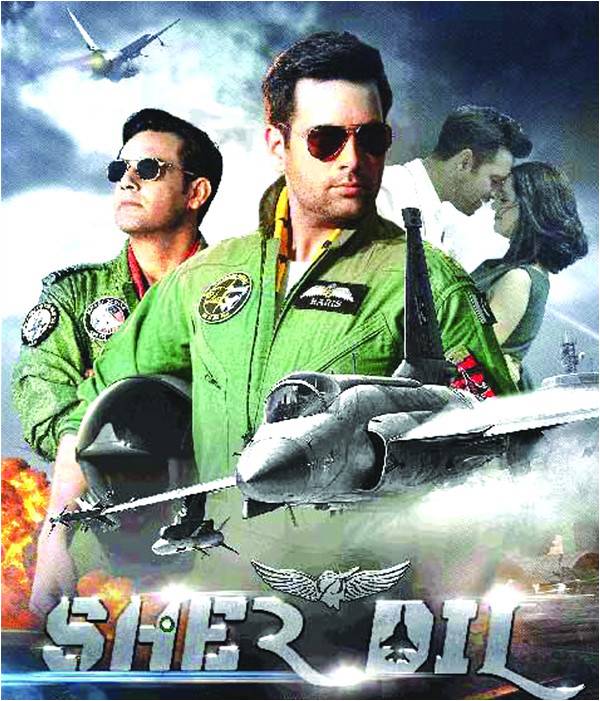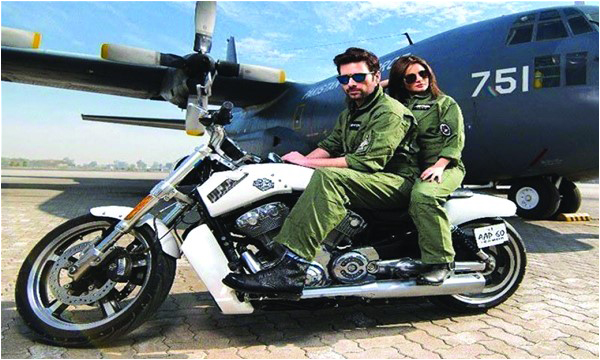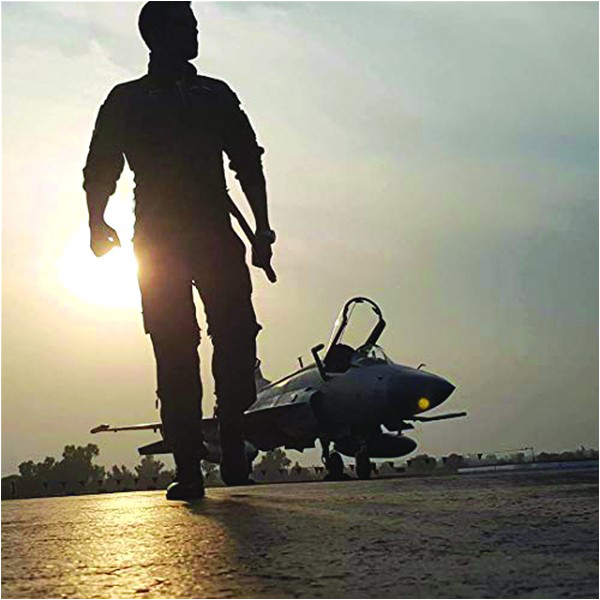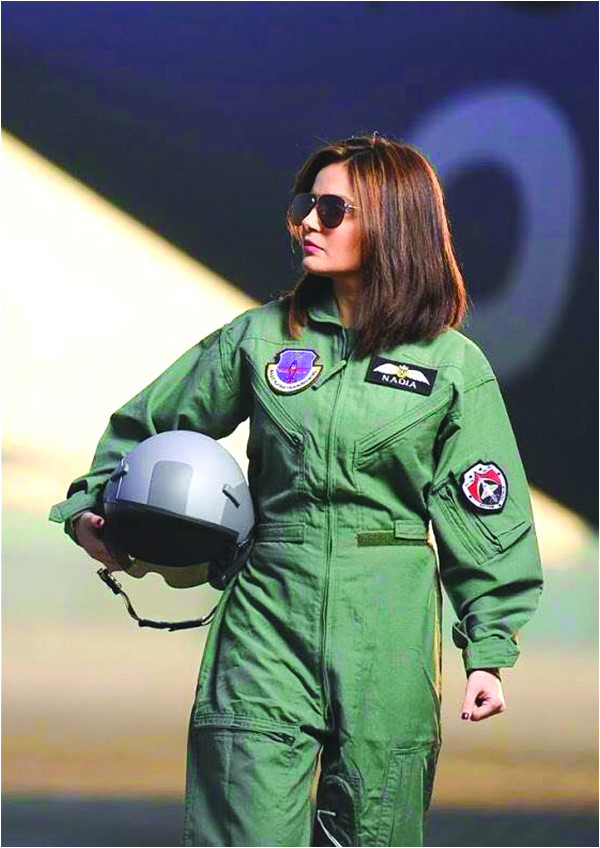
Nobody wants war. Or so everybody claims. Many do so after years beating war drums and cheering on everything that is destined to culminate in some form of warfare.
If there’s one group of people that might have found it hard to conceal their delight at last month’s cross-border skirmishes between the PAF and IAF it would be the makers of Sherdil. And of course, while the entire nation celebrated Pakistan getting one up over India in warfare that was officially the ‘last resort’, for the makers of Sherdil the fact that it transpired – and the manner in which it did – was especially fruitful.
For a film focusing on the PAF, and showcasing Indo-Pak air skirmishes, nothing could have been better marketing than the actual dogfight that took place a month before its release. And that is precisely what makes its many failures that much more ominous.
The regional political climate might facilitate the film’s bid to bring a few more cinemagoers to the multiplexes, but unfortunately it won’t be able to keep the numbers for too long. The primary reason behind this is that despite the world rearranging itself to help Sherdil’s bid, Sherdil does little to help itself.
Not only is the film a rehash of most of what you’ve already seen, it is unfortunately one that brings together the less impressive of what you’ve already gone through.

The Indo-Pak hostility has led to a ban on Bollywood movies in Pakistan as well, which has resulted in last year’s releases being rerun. While this should technically also help Sherdil, and other Pakistani releases, should you mistakenly enter the Parwaaz Hai Junoon screening, you would probably watch about half of Sherdil over there as well.
Not only does it have the same infatuation with Top Gun, it also has similar career counseling with regards to joining the PAF. For those who want to get an idea of how the two films interrelate, just take a look at the two respective movie banners.

In line with the above mentioned career counselling, Haris Mustafa (Mikaal Zulfikar) makes the call out of his love for the country, even though his father doesn’t want him to be a PAF pilot. Again, just like PHJ, Sherdil forgets that it is supposed to be a feature film and not a drama series, and hence after establishing the core plot, the film tries to incorporate a bazillion other unrelated storylines looking to emulate Alpha Bravo Charlie and Sunehrey Din - completely forgetting that neither of the two classic dramas was a two-hour long movie.
Therefore, a love story is squeezed in for Haris, with Sabrina (Armeena Rana Khan) entering the fray. And that’s just one angle in an array of divergent sequences better suited for TV than film, which takes eons to reach the point it wants to make.
That point, of course, hinges around the archenemy that India is. Just like the environment surrounding the film’s release was tailor-made for Sherdil, the film similarly ups the ante on India-bashing to get the most out of it. And there’s no subtlety involved or euphemisms used. India is named and shamed to squeeze as many whistles and cheers out of an otherwise disinterested audience as possible.

Often critiques on Lollywood movies have to be addressed with a ‘for a Pakistani film’ qualification after which one is expected to go easy on the film. But even ‘for a Pakistani film’ Sherdil misses just about every mark, barring some visual dexterity that it shows in some instances.
Last year’s PHJ was hardly groundbreaking, but was still significantly better than Sherdil. It’s evident that Pakistani filmmakers have to work hard to sustain themselves and local cinemas. If such is the offering while Bollywood is banned in the country, one fears for the fate of our multiplexes.
If there’s one group of people that might have found it hard to conceal their delight at last month’s cross-border skirmishes between the PAF and IAF it would be the makers of Sherdil. And of course, while the entire nation celebrated Pakistan getting one up over India in warfare that was officially the ‘last resort’, for the makers of Sherdil the fact that it transpired – and the manner in which it did – was especially fruitful.
For a film focusing on the PAF, and showcasing Indo-Pak air skirmishes, nothing could have been better marketing than the actual dogfight that took place a month before its release. And that is precisely what makes its many failures that much more ominous.
Sherdil misses just about every mark, barring some visual dexterity that it shows in some instances
The regional political climate might facilitate the film’s bid to bring a few more cinemagoers to the multiplexes, but unfortunately it won’t be able to keep the numbers for too long. The primary reason behind this is that despite the world rearranging itself to help Sherdil’s bid, Sherdil does little to help itself.
Not only is the film a rehash of most of what you’ve already seen, it is unfortunately one that brings together the less impressive of what you’ve already gone through.

The Indo-Pak hostility has led to a ban on Bollywood movies in Pakistan as well, which has resulted in last year’s releases being rerun. While this should technically also help Sherdil, and other Pakistani releases, should you mistakenly enter the Parwaaz Hai Junoon screening, you would probably watch about half of Sherdil over there as well.
Not only does it have the same infatuation with Top Gun, it also has similar career counseling with regards to joining the PAF. For those who want to get an idea of how the two films interrelate, just take a look at the two respective movie banners.

In line with the above mentioned career counselling, Haris Mustafa (Mikaal Zulfikar) makes the call out of his love for the country, even though his father doesn’t want him to be a PAF pilot. Again, just like PHJ, Sherdil forgets that it is supposed to be a feature film and not a drama series, and hence after establishing the core plot, the film tries to incorporate a bazillion other unrelated storylines looking to emulate Alpha Bravo Charlie and Sunehrey Din - completely forgetting that neither of the two classic dramas was a two-hour long movie.
Therefore, a love story is squeezed in for Haris, with Sabrina (Armeena Rana Khan) entering the fray. And that’s just one angle in an array of divergent sequences better suited for TV than film, which takes eons to reach the point it wants to make.
That point, of course, hinges around the archenemy that India is. Just like the environment surrounding the film’s release was tailor-made for Sherdil, the film similarly ups the ante on India-bashing to get the most out of it. And there’s no subtlety involved or euphemisms used. India is named and shamed to squeeze as many whistles and cheers out of an otherwise disinterested audience as possible.

Often critiques on Lollywood movies have to be addressed with a ‘for a Pakistani film’ qualification after which one is expected to go easy on the film. But even ‘for a Pakistani film’ Sherdil misses just about every mark, barring some visual dexterity that it shows in some instances.
Last year’s PHJ was hardly groundbreaking, but was still significantly better than Sherdil. It’s evident that Pakistani filmmakers have to work hard to sustain themselves and local cinemas. If such is the offering while Bollywood is banned in the country, one fears for the fate of our multiplexes.

